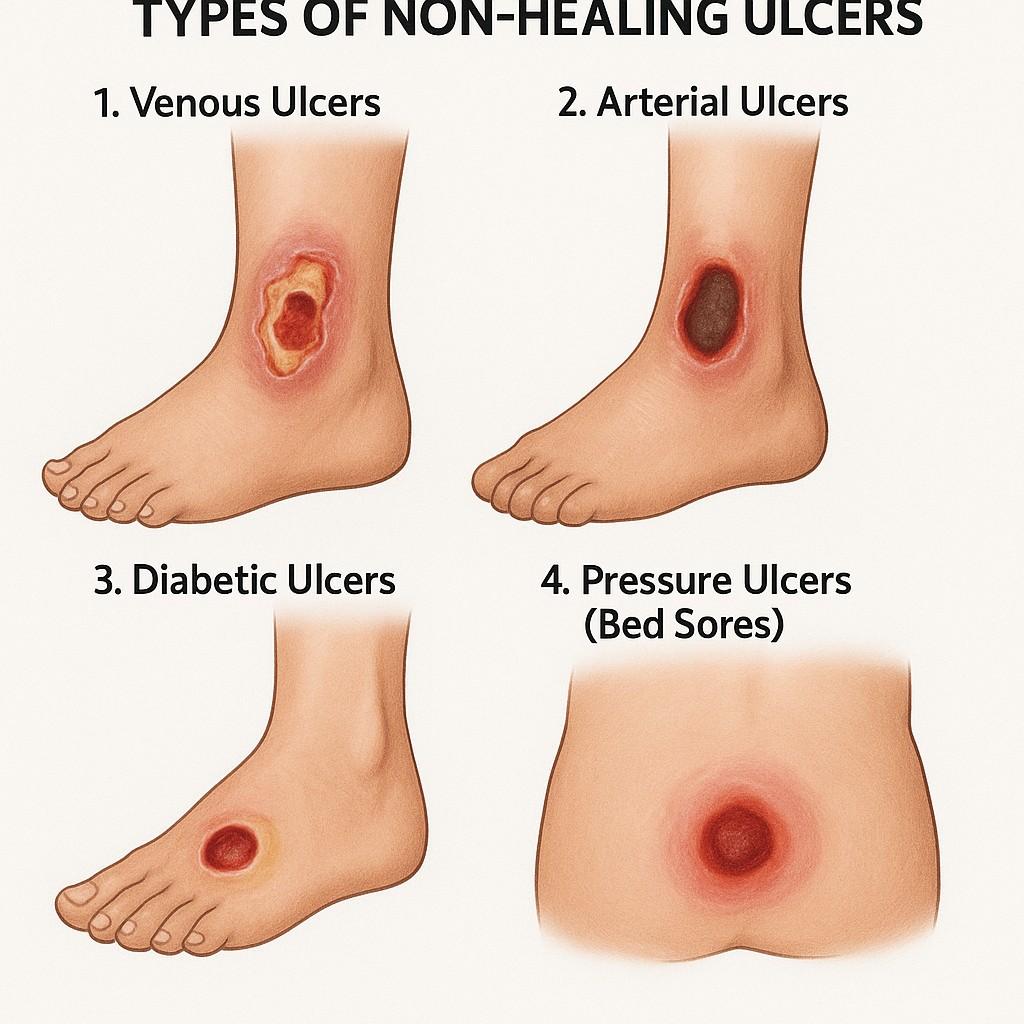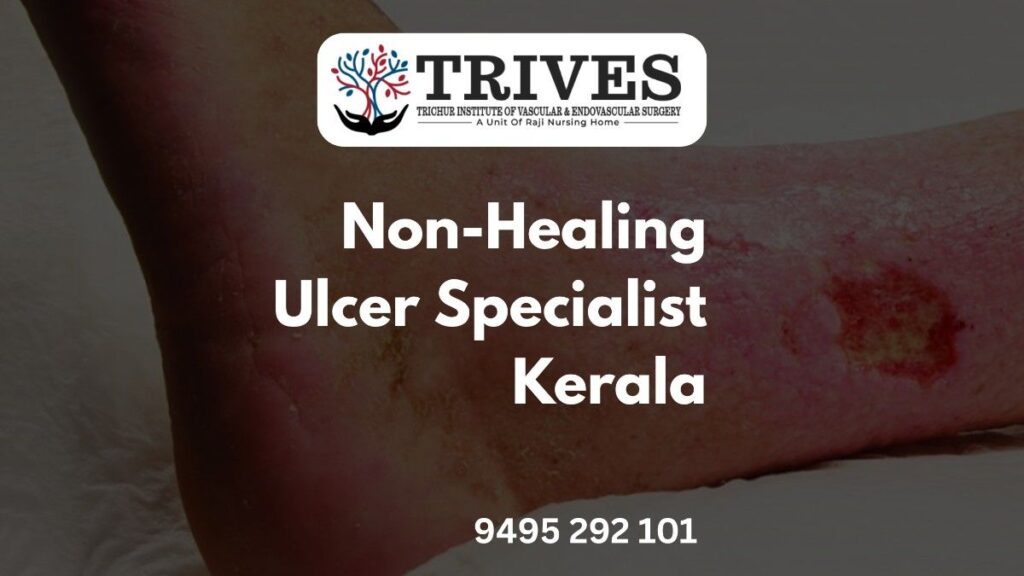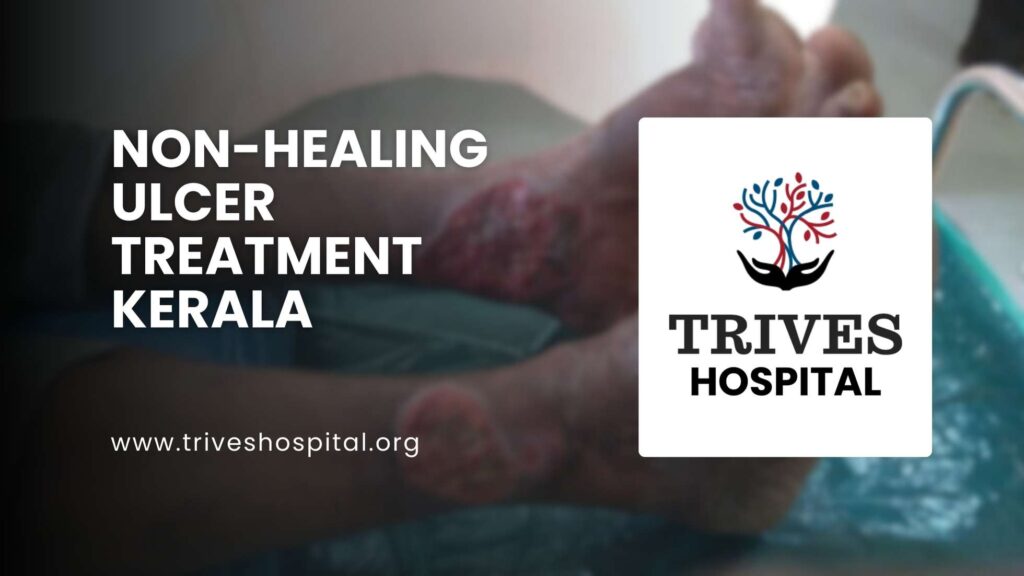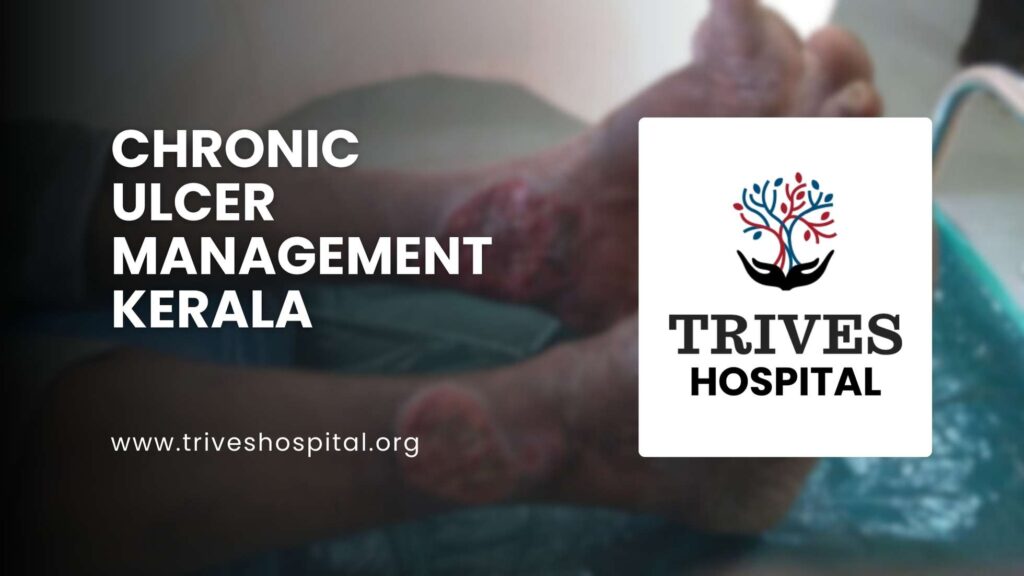Chronic wounds that don’t heal for weeks or months can affect your quality of life and even lead to serious complications. These are known as non-healing ulcers, and they require the expertise of a non-healing ulcer specialist in Kerala to manage and treat effectively. If you or a loved one is suffering from such a condition, it’s essential to seek expert care. At TRIVES Hospital, Thrissur, our team of specialists is equipped with advanced medical knowledge and technology to help heal non-healing ulcers with compassion and precision.
This blog is your comprehensive guide to understanding non-healing ulcers, their causes, symptoms, treatments, and why TRIVES Hospital is home to the best non-healing ulcer specialist in Kerala.
Understanding Non-Healing Ulcers:Why Your Wound Isn’t Healing
Wounds are a natural and essential part of the body’s healing process following an injury. Under normal circumstances, wounds progress through a predictable series of stages: inflammation, where the body’s immune system responds to the injury; tissue formation, where new tissue begins to develop; and remodeling, where the new tissue strengthens and matures. Most minor wounds complete this process within a few days to a few weeks, especially when proper wound care and hygiene are maintained.
However, not all wounds follow this normal healing timeline. In certain cases, wounds can become chronic, failing to heal as expected. When a wound does not show noticeable improvement within two weeks, or if it does not completely heal within six weeks, it is typically classified as a non-healing ulcer. These wounds are also commonly referred to as chronic ulcers or chronic non-healing wounds.
Non-healing ulcers can be caused by a variety of underlying health conditions, including diabetes, poor circulation (peripheral artery disease), venous insufficiency, neuropathy, infections, or prolonged pressure on the skin. In some cases, lifestyle factors such as smoking, poor nutrition, or immobility can contribute to delayed healing. These ulcers can become painful, prone to infection, and may even lead to more severe complications if not treated appropriately.
Given the complexity of these wounds, specialized medical attention is essential. Treating a non-healing ulcer requires more than just topical creams or simple bandaging—it demands a comprehensive, multidisciplinary approach that addresses both the wound itself and the root cause behind its delayed healing.If you or a loved one is dealing with a persistent wound that shows little or no improvement, it is imperative to consult a non-healing ulcer specialist in Kerala. Kerala is home to several reputed medical professionals and advanced wound care centers equipped with the latest diagnostic tools and treatment technologies. A specialist will conduct a thorough evaluation, which may include wound culture tests, vascular assessments, blood sugar monitoring, and other diagnostic procedures to pinpoint the reason behind the impaired healing.
Common Causes of Non-Healing Ulcers
Understanding the root cause of a non-healing wound is the first step toward effective treatment. Here are some of the most common causes:
1. Diabetes Mellitus
One of the leading contributors to non-healing ulcers is diabetes. Elevated blood glucose levels can damage blood vessels, impair nerve function (neuropathy), and reduce the body’s ability to fight infections. Diabetic foot ulcers are particularly common and require prompt care from a non-healing ulcer specialist in Kerala to prevent complications like gangrene or amputation.
2. Poor Circulation
Arterial disease (restricted blood flow due to narrowed arteries) or venous insufficiency (impaired return of blood from the legs) can severely limit the supply of oxygen and nutrients to the wound site. Without proper circulation, the wound can’t heal effectively. Vascular evaluation and appropriate intervention from a non-healing ulcer specialist Kerala can significantly improve outcomes.
3. Infections
When bacteria contaminate a wound, they can cause local inflammation, tissue breakdown, and delayed healing. Infected wounds may appear red, swollen, warm, and emit pus or an unpleasant odor. A non-healing ulcer specialist in Kerala can identify the type of infection and prescribe suitable antibiotics or advanced wound care therapies.
4. Pressure Ulcers (Bed Sores)
Also known as decubitus ulcers, pressure ulcers result from continuous pressure on a particular area, commonly in patients who are bedridden or have limited mobility. These ulcers often form over bony prominences like the heels, hips, or sacrum. Specialized wound care, pressure relief techniques, and monitoring from a non-healing ulcer specialist Kerala are essential for recovery.
5. Nutritional Deficiencies
Adequate nutrition is vital for wound healing. Deficiencies in vitamin C, zinc, protein, and other essential nutrients can delay tissue repair. A non-healing ulcer specialist in Kerala can assess nutritional status and recommend diet modifications or supplements to support the healing process.
6. Immune System Disorders
Conditions that impair the immune response, such as HIV/AIDS, autoimmune diseases, or long-term steroid use, can hinder the body’s ability to repair wounds. In such cases, multidisciplinary care involving a non-healing ulcer specialist Kerala is often required to manage both the wound and the underlying immune condition.
Early Signs of a Non-Healing Ulcer You Shouldn't Ignore
Non-healing ulcers are more than just stubborn wounds—they can be early warning signs of serious underlying conditions such as diabetes, poor circulation, or infection. Timely recognition and treatment are crucial to avoid complications such as deep tissue infections, gangrene, or even limb amputation.
Here are some early signs of a non-healing ulcer that require immediate medical attention:
Redness and Swelling Around the Wound
Persistent inflammation, redness, and puffiness may indicate an infection or poor circulation around the affected area. If the swelling doesn’t subside within a few days, it’s a warning sign.
Discharge or Pus Formation
Clear fluid or pus oozing from the wound suggests infection. Yellow or greenish discharge is especially concerning and should not be ignored.
Foul Odor from the Wound
A bad smell emanating from the ulcer usually indicates the presence of dead tissue or bacteria. This can escalate quickly and lead to systemic infection.
Increased Pain or Sensitivity
If the ulcer becomes more painful over time or feels unusually tender, it may be worsening beneath the surface—even if the size doesn’t appear to change.
Blackened or Dead Tissue (Necrosis)
The presence of dark, hardened skin around the wound may be a sign of necrosis—a dangerous condition that requires urgent care from a non-healing ulcer specialist in Kerala.
Fever or Chills
These systemic symptoms may indicate that the infection has spread beyond the wound, potentially entering the bloodstream. This is a medical emergency.
Types of Non-Healing Ulcers

Non-healing ulcers are wounds that fail to show significant signs of healing within a few weeks. Identifying the specific type of ulcer is crucial for effective treatment. At TRIVES Hospital, a trusted non-healing ulcer specialist in Kerala provides expert diagnosis and personalized treatment strategies for various chronic wounds. Below is a detailed overview of the most common types of non-healing ulcers:
1. Venous Ulcers
These are the most common type of leg ulcers, often developing on the lower legs and around the ankles. They are caused by poor venous circulation, which leads to increased pressure in the veins. Common symptoms include:
Dark, discolored skin around the ulcer
Swelling in the leg
Itchiness or heaviness
Skin hardening and eczema-like symptoms
A non-healing ulcer specialist in Kerala can assess venous function using Doppler ultrasound and recommend compression therapy, wound dressings, and lifestyle changes to promote healing.
2. Arterial Ulcers
These ulcers develop due to reduced blood flow from narrowed or blocked arteries. Often seen on the toes, heels, or pressure points, arterial ulcers have a “punched-out” appearance and are typically very painful. Key features include:
Cold, pale skin around the wound
Minimal bleeding
Delayed capillary refill
Loss of hair on legs and feet
Management usually involves improving circulation through medications or surgical interventions. Consulting a non-healing ulcer specialist Kerala ensures timely diagnosis and vascular evaluation to prevent complications like gangrene.
3. Diabetic Ulcers
Diabetic foot ulcers are a major concern for people with uncontrolled diabetes. Neuropathy (nerve damage) and poor circulation make the feet vulnerable to injury, often without the patient realizing it. Typical characteristics are:
Located on the soles of the feet or pressure points
Surrounded by thickened skin or calluses
Prone to infection
Slow or absent healing response
At TRIVES, a non-healing ulcer specialist in Kerala employs a multidisciplinary approach, including glucose control, debridement, infection management, offloading, and advanced wound care to treat diabetic ulcers effectively.
4. Pressure Ulcers (Bed Sores)
Pressure ulcers, also known as bed sores, occur in individuals who are bedridden, wheelchair-bound, or immobile for long periods. These ulcers result from sustained pressure on bony prominences such as the back, hips, elbows, and heels. Stages include:
Red, unbroken skin
Open sores with damaged tissue
Deep ulcers exposing muscle or bone
A non-healing ulcer specialist Kerala at TRIVES ensures comprehensive care, including pressure redistribution, wound cleaning, specialized dressings, nutritional support, and caregiver education.
Meet the Expert: Dr. Vineeth Kumar P M
Dr. Vineeth Kumar P M brings a unique blend of surgical precision, endovascular expertise, and advanced imaging knowledge, making him one of the most trusted vascular specialists in the region. With years of rigorous training and hands-on experience, he is highly regarded for managing complex cases of chronic wounds and non-healing ulcers resulting from peripheral arterial disease (PAD), diabetes, venous insufficiency, and trauma.
Educational Background & Clinical Training
Dr. Vineeth’s robust academic foundation and extensive clinical training set him apart in the field of vascular surgery:
MBBS — Government Medical College, Kozhikode
MS in General Surgery — Postgraduate Institute of Medical Education & Research (PGI), Chandigarh
MCh in Vascular Surgery — Sree Chitra Tirunal Institute for Medical Sciences & Technology (SCTIMST), Trivandrum
FIAGES — Fellowship in Minimal Access Surgery
FMAS—Fellowship in Minimal Access Surgery
These qualifications are further complemented by specialized training in endovascular techniques, which play a vital role in the management of vascular complications that often underlie non-healing ulcers.
Advanced Endovascular Training
Dr. Vineeth has undergone cutting-edge training in prestigious institutions, ensuring he remains at the forefront of minimally invasive vascular care.
Medanta — The Medicity, Delhi: Outstation Endovascular Training
Sir Ganga Ram Hospital, Delhi: Advanced Endovascular Techniques
ISIR, SCTIMST, Trivandrum: Specialized training in Imaging Science and Interventional Radiology
This expertise allows Dr. Vineeth to perform a wide range of image-guided interventions and vascular reconstructions crucial for promoting healing in chronic ulcer cases.
Contact TRIVES Hospital Today
TRIVES Hospital
D.N Menon Road, Chembukkavu, Thrissur 680020
Phone: 9495 292 101 / +91 94952 92866
Email: info@trives.in
If you are looking for a reputed non-healing ulcer specialist in Kerala, look no further than TRIVES Hospital. Book your consultation today and take the first step toward complete healing.
FAQ
1. What is a non-healing ulcer?
It is a wound that doesn’t heal within the expected timeframe, usually more than 6 weeks.
2. Who is the best non-healing ulcer specialist in Kerala?
TRIVES Hospital in Thrissur is home to some of the most experienced specialists in the state.
3. What causes non-healing ulcers?
Common causes include diabetes, poor circulation, pressure, and infections.
4. How are non-healing ulcers diagnosed?
Through Doppler scans, tissue biopsy, and lab tests.
5. Is surgery always needed for treatment?
Not always. Many ulcers respond well to medical management and wound care.
6. How long does healing take?
It varies. With proper treatment, most ulcers heal within 6 to 12 weeks.
7. Are non-healing ulcers dangerous?
Yes. If untreated, they can lead to serious complications including amputation.
8. Does insurance cover treatment?
Most health insurance plans cover ulcer treatment. Please confirm with your provider.
9. Can ulcers be prevented?
Yes, by managing diabetes, proper foot care, and a healthy lifestyle.
10. How do I book an appointment with a specialist?
Call TRIVES Hospital at 9495 292 101 or +91 94952 92866, or email info@trives.in


